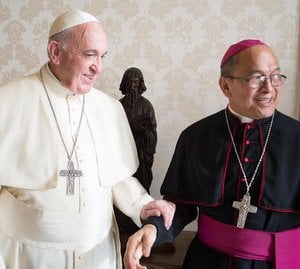There has been some anti-Semitic sentiments in one of my posts regarding the Jewish people. For some unknown reason, those who oppose the Way think that we are Jewish. Nothing can be further from the truth. The Way worships Jesus Christ. We have icons of Jesus in the Way, so how one comes to this conclusion is beyond me. At any rate, the Catholic Church do recognize her Jewish roots and heritage. The Church is not ashamed of her heritage. She still holds the Old Testament books as the "word of God." And the Old Testament books speaks of the Jewish people. Even the Popes recognize our heritage and link with the Jewish people. Below is a photo of St. John Paul II praying before the Jewish Wailing Wall in Israel.

There has also been much criticism of the Jewish menorah on the altar of the Neocatechumenal Way. Actually, the menorah is only there during special occasions such as Easter Vigil. Below are photos of our last two Popes lighting the Jewish menorah. Pope Benedict lits the menorah in 2001 and recently Pope Francis did the same:
Does this mean that these Popes are Jewish????? Of course not. They do not have any problems lighting the Jewish menorah because they recognize our Jewish heritage with the Jewish people. After all, the seven lamp stands mentioned in the Book of Revelation is the Jewish menorah (See Revelations 4:5). So, all the angels and hosts in Heaven recognize the menorah, which the Apostle John saw in God's kingdom.
Below is a photo of Cardinal O'Malley lighting the last candle on the Yom HaShaoah Menorah, which was moved from Boston to the new headquarters of the Boston Archdiocese in Braintree.
In fact, one can even find the Jewish menorah is many Eastern Orthodox and Catholic Churches. Does this mean that these Churches are REALLY Jewish? No, but they recognize their Jewish roots and heritage. By doing so, they recognize that Jesus Christ Himself was raised Jewish. Also, according to CNN, dated December, 1997:
A Hanukkah candle was lit at the Vatican Tuesday for the first time in history, an event Israeli ambassador Aharon Lopez called "unique." The candle, which was lit by Cardinal Edward Idris Cassidy of Australia on behalf of Pope John Paul II, was next to an olive tree that commemorates diplomatic ties between Israel and the Holy See. Lopez said the ceremony marked "an important chapter in the historic process of reconciliation between Jews and the Catholic Church."
Does this mean that the Vatican has become Jewish?? No. Absolutely not. But again, the Vatican has no problem lighting the menorah or a candle for Hankkah because the Catholic Church recognize her Jewish roots. And where in the Bible does it say that practicing Jewish celebrations was wrong???? St. Paul never said that the Jewish custom of circumcision was wrong. He simply said that the Gentile converts did not need to practice it. There was something better than circumcision, and that was baptism.
He should be made clear that Pope John Paul II is not Jewish despite that he prayed at the Jewish wailing wall and lit a Jewish menorah. Pope Benedict XVI and Cardinal O'Malley are also not Jewish despite that they also lit a Jewish menorah. The NCW is also not Jewish despite that we sometimes have a menorah on our altar. The Eastern Orthodox Church and the Eastern Catholics are also not Jewish despite that they also have a menorah in their Churches. So, how does Chuck White and Tim Rohr conclude that the NCW is Jewish is beyond me. As I said, all they do is come up with their own conclusions without asking us any questions. Everything they have to say about the NCW is all one-sided because they purposely left out our input.
 Since Archbishop Apuron has invited Pope Francis to Guam before going to the Philippines, I am hoping that the Pope would decide to stop here for a few days. We were honored to have St. John Paul II visit Guam in 1981, and it would be a great honor to have Pope Francis visit us as well. I hope he would be able to stay for a few days. It would even be better if he could celebrate Mass in the Cathedral and then have Eucharist with members of the Way. I am certain that the Agana communities will get first priorities.
Since Archbishop Apuron has invited Pope Francis to Guam before going to the Philippines, I am hoping that the Pope would decide to stop here for a few days. We were honored to have St. John Paul II visit Guam in 1981, and it would be a great honor to have Pope Francis visit us as well. I hope he would be able to stay for a few days. It would even be better if he could celebrate Mass in the Cathedral and then have Eucharist with members of the Way. I am certain that the Agana communities will get first priorities. ![The Eucharist has been a key theme in the depictions of the Last Supper in Christian art,[1] as in this 16th-century Juan de Juanes painting.](http://upload.wikimedia.org/wikipedia/commons/thumb/b/bc/%C3%9Altima_Cena_-_Juan_de_Juanes.jpg/1920px-%C3%9Altima_Cena_-_Juan_de_Juanes.jpg)



